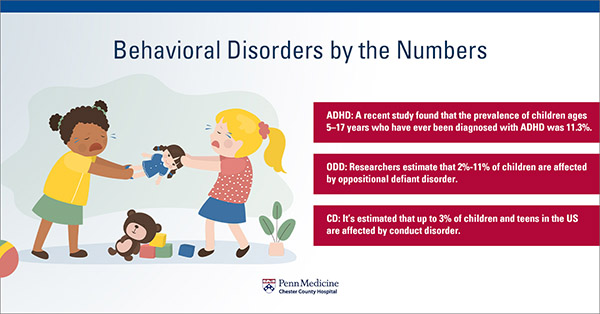
While parenting can be a beautiful journey full of joyful moments that many cherish, it may not always be perfect. This lifelong commitment can also come with uncertainties and challenges that teach parents many lessons along the way.
One such challenge is understanding and properly addressing your children when they aren't on their best behavior. Acting out at times is a natural part of childhood, especially when children are still learning to understand and articulate their emotions. Parents should observe this behavior and look for any patterns to determine if they are simply expressing themselves or if something more serious is going on.
Is your child experiencing a regular temper tantrum that can be resolved with discipline, or is it a larger behavioral disorder that requires medical attention? Understanding the nuances between the two circumstances can empower parents by equipping them with the knowledge and strategies needed to navigate this complex terrain.
Understanding Behavioral Disorders
With 21.8% of US children ages 3 to 17 having one or more behavioral, mental, or emotional health conditions, parents should pay attention to any signs that their children may be affected by a behavioral disorder.
According to Jason Komasz, MD, Medical Director, CHOP Newborn and Pediatric Care at Chester County Hospital, behavioral disorders refer to a group of conditions causing people to consistently create disruptions to others; and they can manifest in various ways, including impulsivity, aggression, defiance, and difficulty in regulating emotions.
"A common example is Attention-Deficit/Hyperactivity Disorder (ADHD), which is a disorder based in the brain that can cause children to be hyperactive and/or easily distracted,"” says Dr. Komasz. "The most prominent behavioral disorder in children, it affects an estimated 11.3% of children ages 5–17 years, according to a recent study."
Other behavioral disorders include Oppositional Defiant Disorder (ODD) and Conduct Disorder (CD).
Behavioral disorders are not always a result of poor parenting or a lack of discipline. They can be rooted in biological, genetic or neurological factors, too. For instance, ADHD is associated with differences in brain structure, leading to challenges in attention, impulse control and hyperactivity. On the other hand, ODD may be caused by developmental or learning issues and CD may stem from a combination of genetic and environmental influences.

Identifying Signs of Behavioral Disorders
Recognizing if your child has a behavioral disorder requires careful observation and professional assessment. Parents need to understand what to look for as they determine the path forward.
Here are 5 common signs of behavioral disorders in children:
- Persistent impulsivity and hyperactivity
- Difficulty following instructions
- Blaming other people for their own mistakes or misbehavior
- Breaking rules at home or in school
- Being aggressive and causing harm to others
"If you notice any signs that may point to your child having a behavioral disorder, seek evaluation and support from qualified mental health professionals, such as pediatricians, child psychologists, or psychiatrists," Dr. Komasz suggests. "Early intervention and appropriate treatment can significantly improve outcomes and help your child thrive."
Differentiating Behavioral Issues From Discipline Problems
Even with the understanding of what behavioral disorders are and how they can manifest in children, it may still be a bit confusing for parents to distinguish between the disorders and discipline problems, especially when certain behaviors among children can overlap. Keeping in mind a few key considerations during your exploration can help you properly assess your child's behavior.
- Frequency and Severity: Behavioral disorders involve frequent outbursts and disturbances, no matter the setting, and are less responsive to environmental changes or disciplinary measures. In contrast, discipline issues may arise less frequently and may be linked to specific triggers or situations. They can often be addressed through proactive parenting strategies and consistent reinforcement of expectations.
- Developmental Considerations: It's essential to consider your child's age and developmental stage when evaluating their behavior. Young children, for instance, may display tantrums and defiance as part of normal development, while older children may demonstrate more complex behaviors influenced by peer pressure, academic stress, or family dynamics.
- Response to Intervention: Monitor your child's response to interventions and disciplining. Behavioral disorders typically require comprehensive treatment approaches, including therapy, medication, and behavioral interventions. If your child's behaviors persist despite consistent discipline and support, it may indicate an underlying disorder that requires professional intervention.
Navigating the Path Forward
As a parent, navigating the complexities of child behavior can feel overwhelming at times. However, remember that you are not alone and support is available.
Take the time to do your own thorough research on different behavioral disorders, effective parenting strategies, and available resources in our community so that you can make informed decisions and advocate for your child's needs. Additionally, if you have concerns about your child's behavior, don't hesitate to seek guidance from medical professionals. A comprehensive evaluation can provide valuable insights and guide personalized treatment planning.
Separately, it’s important to surround yourself with a supportive network of family, friends, and professionals who understand your challenges and can offer guidance, empathy, and encouragement along the way. Remember to prioritize your own well-being amidst the demands of parenting and know that it's okay to ask for help.
By taking the initiative to read this and uncover steps you can take to understand your child's behavior and parent them accordingly, you're already on the right path. With patience, empathy, and perseverance, you can navigate this journey with confidence, empowering your child to reach their full potential.
Meet the Experts in Kids' Health
Chester County Hospital has a unique affiliation with The Children's Hospital of Philadelphia, including an inpatient pediatric unit. Learn more about the innovative programs and extensive resources of CHOP -- a world leader in pediatric and neonatal medicine – found locally at Chester County Hospital.